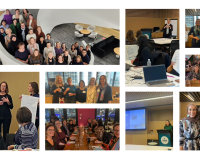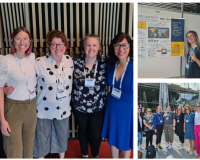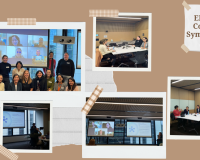
Highlights of the 2025 CRE EPOCH-Translate Annual Meeting
On 28-29 May, more than 30 EPOCH-Translate researchers came together at Deakin Downtown in Melbourne for our annual meeting, with several more joining online. The two days were productive, filled with learning, sharing ideas, and planning for what’s next.
Day One
Day One showcased the excellent work happening across our research streams, with a focus on engagement with stakeholders and addressing the needs of priority populations to support early childhood obesity prevention.
What We Learned
Building strong stakeholder relationships takes time, so early and consistent engagement with stakeholders is key. Using a combination of advisory groups, co-designing research, social media, and newsletters helps to maintain connections with a range of stakeholder groups and build momentum. Flexibility is essential – we must be ready to act when policy windows open. Importantly, lasting impact requires a shift from focusing on individual behaviour change to driving broader policy and systems-level change.
There is a need for more consistency in how cultural background is defined in Australian research. It is also important to ensure that the language and materials used in programs are accessible and appropriate for priority populations. To design effective interventions, we must understand what these groups value. Involving health professionals and peer workers from priority populations, and engaging them throughout the research process, is key to achieving this.
EPOCH-Translate Mentoring Program
We ended the day with a session on the EPOCH-Translate Mentoring Program. This capacity-building initiative fosters supportive, cross-institutional relationships between EMCRs and senior mentors or peer mentors, with the aim to promote learning, reflection, and professional growth.
Day Two
On Day Two, our talented early and mid-career researchers shared their impactful work in rapid-fire presentations. Their work covered a range of topics, including scaling up early childhood obesity prevention programs, physical activity, screen time, oral health, priority populations, household food insecurity, infant feeding outcome measurement, co-design in early childhood education and care settings, program evaluation, and research integrity assessment.
Capacity-Building Session
We were fortunate to have Jane Martin (Executive Manager of the Food for Health Alliance) as guest speaker for our capacity-building session. Jane’s talk on the Role of Research in Public Health Advocacy highlighted key messages for driving policy change in public health:
- Ensure monitoring and evaluation are part of research
- Leverage strong community support to advocate for evidence-informed policy reform
- Present a clear vision, identify barriers, and propose actionable solutions
Looking Ahead
Key priorities identified included understanding how changing parenting contexts may require adaptations to child and family services, applying an equity and systems lens to policy and program design, and creating supportive food and physical activity environments. The importance of developing tailored interventions was emphasised, along with the need to improve access to preventive care and model the long-term impacts of early childhood interventions.
We closed the meeting with thoughtful reflections and renewed focus on our shared goals for the year ahead!














